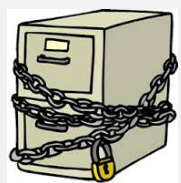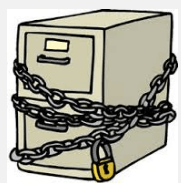 As all University researchers working with language know, if you record language, you must keep it in a locked filing cabinet or a password protected web location. For ethical reasons. Our Institutional Review Boards will insist on this.
As all University researchers working with language know, if you record language, you must keep it in a locked filing cabinet or a password protected web location. For ethical reasons. Our Institutional Review Boards will insist on this.
What (you may be wondering) is ethical about locking up language samples? Even keeping them from the speakers who created them? The idea is that if you are collecting talk from someone, you need to guard that “data” to protect the speakers from anything damning (embarrassing? false?) about them that those samples might reveal.
Only the researcher will still have access to this data. Ostensibly, in the role of a professional, with the training necessary to responsibly handle this language, the researcher will have the skills and knowledge to do the right thing, should they want to say something touchy about that language.
But, even as researchers lock up the drawer or type up a passcode for a website, people continue to talk. The voices we record for our research do not fall silent once we turn off the recording device.
Speech –our own and others’—is all around us. How do we protect those people from being interpreted in dangerous ways by the random ordinary people walking around judging how they speak? We don’t!
Fortunately, in real life we don’t need to hack into some password protected site to hear real language—or to analyze it.
We don’t even need to be professionally or academically affiliated in any way. Many people out there listening to the freely available language samples are expert language analysts. Their expertise may differ from that of a PhD Linguist, Applied Linguist, Sociologist, or Linguistic Anthropologist—but those everyday language analysts (I call them Citizen Sociolinguists) are not necessarily any more or less responsible in their interpretation of other peoples’ speech than a trained academic researcher.
Nor are those everyday analysts necessarily more or less tuned into their sense of ethical obligation toward speakers.
Nobody–University researchers or everyday opinionators—exclusively holds the ethical high ground when it comes to making statements about other peoples’ language.
Nobody has a premium on dumb or misguided interpretations—or on the most definitive explanation.
A good analogy might be the “Traditional Dictionary” versus “Urban Dictionary”. Which is most definitive? It depends on what you’re looking for and what sorts knowledge you care about.
Similarly, “Sociolinguist” versus “Citizen Sociolinguist”: A sociolinguist may notice, measure, and catalogue discrete aspects of sound—but a citizen sociolinguist may notice identical features and simultaneously many other social features that go with those discrete linguistic bits: the types of people who use that type of speech, the way they dress, where they live, or personal stories and experiences with that bit of sound. Anyone can easily access these types of everyday insight by looking up questions about language on line. Google “How to speak like a _____” and you will encounter many examples of Citizen Sociolinguistic analysis—from the most raw to the most subtly incisive—and you will see many comments sounding off on the accuracy of these linguistic portraits.
Back to Locking up Language: When we officially gather and lock away some bits of language, we also place limits on our own knowledge, because we only let a few people interpret it and publish the results. Locked up language isn’t even available to the people who spoke it.
So, what to conclude?
I’d like to suggest an Open Source approach to language. If you record some, share it! And, certainly share it with the people who spoke it. But also share your analysis. Let ordinary speakers share theirs. Just as Open Source software improves when more coders are involved, understanding human language will inevitably become more important and relevant when it includes more perspectives. Tell that to your Institutional Review Board!
But—you may disagree. How might sharing language data be unethical? What might we lose in the open-source approach? What are other ways to ensure all language gets treated with respect? Please share your thoughts below!

My university’s IRB goes one step further: They want us to “destroy” our language samples once the “study is complete”! Not on my watch!
LikeLiked by 1 person
I have been in the middle of transcribing the words of some third graders I worked with for a school year as I prepare to write my dissertation. There are some Citizen Sociolinguists I admire (i.e., teachers) whose wisdom I wish I could consult, but I find myself siding with caution.
This piece is a good argument for challenging some constraints.
I did share a piece with the students themselves, though, and that was such an insightful exercise.
LikeLiked by 1 person
Thanks for the comment, Robert! I’ve found third graders to be surprisingly expert Citizen Sociolinguists–I’ve found this almost a perfect time to talk to kids about what they think about their own and others’ language. And Karen Galas’ books have many examples of her playing back tapes to even younger kids and problem solving with them as they astutely solve problems with classroom dynamics together: such as, “what are we going to do about the Big Talkers?”
LikeLike
Including archiving in the initial IRB/Ethics application is one way to avoid this. The increasing focus on corpus creation in digital humanities means people are starting to understand that data collection/curation is an important research output!
c.f. the discussion in the Language Documentation field: http://www.paradisec.org.au/blog/2012/11/counting-collections/
LikeLiked by 1 person